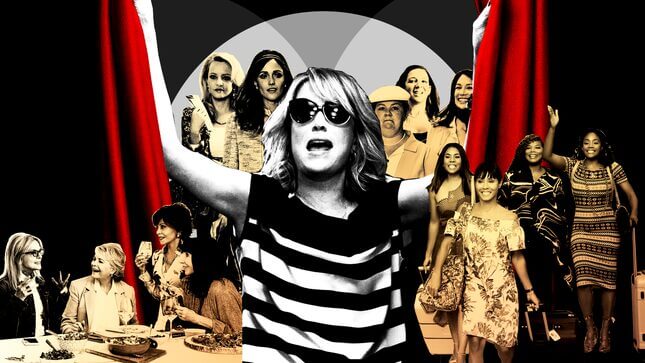Girls Trips, Book Clubs, and Bachelorettes: What Makes a Women's Ensemble Comedy Great?
EntertainmentMovies
Illustration: Array
A curious case of a promising comedy in theory but majorly disappointing in execution was the recent Netflix film Wine Country, starring Saturday Night Live alumni Amy Poehler, Maya Rudolph, Tina Fey, and Rachel Dratch as wine-loving best friends who reunite for a tipsy birthday gathering in Napa. The movie possesses several cringe-worthy moments: a long rant about how millennials suck and stories about being overworked, losing work, and getting a potentially fatal medical diagnosis, all of which feel shoved into the film’s freewheeling plot, clearly aiming for an emotional resonance that is so scattered these plot lines end up feeling stilted.
Watching Poehler play a sad, vacation control-freak and the rest of the actors similarly miscast, it didn’t make sense to me why these women, already close friends, didn’t make a movie that played more to their individual comedic strengths and distinct personalities. The movie’s easy vacation framework felt more like a constraint. But this plot structure is often the fate of women-led ensemble comedies.
It felt like something changed with Bridesmaids. Given the film’s widespread commercial success—over $288 million worldwide at the box office—and critical praise, you’d think a comedy written and starring women had never existed before it. Critics and media positioned the movie as a “turning point for feminism and comedy” and a film that “allows” women to be funny. “We weren’t thinking, ‘Now it’s the girls’ turn to make a really funny movie’ or this is a feminist thing or anything like that,” Kristen Wiig said in 2011.“We just sat down and said, ‘Wouldn’t this be funny?’”
Such instant reverence for the film—hailed as groundbreaking for women, for comedy, and for women in comedy—while perhaps a little hyperbolic in retrospect, made sense at the time. Bridesmaids chased a brotastic wave of movies like Paul Blart: Mall Cop and The Hangover, when the main alternative for women seeking mainstream movies that didn’t relegate them to the background were romantic comedies. Bridesmaids bridged the gap and confirmed the apparently revolutionary thesis that audiences would die laughing at the sight of Maya Rudolph and Melissa McCarthy shitting themselves in the middle of a bridal shop. Women could be gross; they could be insufferable; they were, and always have been, very, very funny.
The all-around poor execution is… more about bad stories or scripts, and expectations that funny women alone should be able to carry a film, even in the face of insurmountable flaws.
Rather than use Bridesmaids as a testament to why more women performers and writers should have their films funded and created in similar fashion, though, Hollywood did what Hollywood does by trying to replicate the movie’s success in various, lesser form. The stars of Bridesmaids may have simply created the funniest comedy they could think of (“Bitch, I’m just making comedies! I happen to be a woman!” Rudolph recently said of its success), but suddenly there was a financial incentive to make more movies like it. Leslye Headland said she was turned away by financiers for her 2012 film Bachelorette, but after the success of Bridesmaids, they were suddenly on board. “Nothing opens Hollywood’s eyes more than something making money,” Paul Feig, director of Bridesmaids, The Heat, and Ghostbusters, tells Jezebel. “Nobody’s going to go: We should just do this. It’s not going to make any money, but we should do this.”
Part of what makes a movie like Bridesmaids so successful is a brilliant ensemble cast—a comedy is nothing without characters to sell both the script and “the funny.” But there’s much more to that success than simply assembling a random group of funny women, which is why the formula that’s being replicated in Hollywood continues to fail. The all-around poor execution is less about individual actors and more about bad stories or scripts, and expectations that funny women alone should be able to carry a film, even in the face of insurmountable flaws.
Plenty of movies have crept in the shadow of Bridesmaids to marginal success: Rough Night’s lackluster story about a bachelorette party gone awry; Bad Moms trading in tired stereotypes of bad wine mommies; How to Be Single’s chopped together structure; the lazily titled Fun Mom Dinner, a blip in the careers of its cast, including Toni Colette and Molly Shannon. In her piece “Crazy Vegas Stepmom Party: We Need to Talk About the Female Ensemble Comedy,” writer Issy Beech noted that many of these films were “tossed together like a last minute salad.”
The salad often includes a number of clichés: a vacation locale for the women to convene, some gross-out humor, a drug trip sequence. These movies, in an effort to depict stale ideas of “raunchy” women, fall into the trap of tired tropes. The fact that the women need to feel real then gets lost in the mix.
-

-

-

-

-

-

-

-

-

-

-

-

-

-

-

-

-

-

-

-

-

-

-

-

-

-

-

-

-

-

-

-

-

-

-

-

-

-

-

-








































